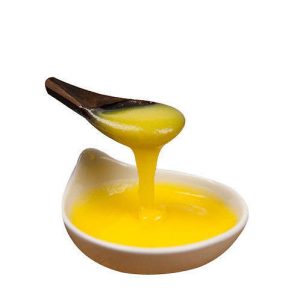Health Benefits of Ghee-Regular 1 teaspoon of Ghee can tremendously contribute for brain development and healthy weight gain of your growing child/babies.
What is Ghee?
Before knowing the health benefits of Ghee first we need to what is Ghee? To define Ghee in a few words, it is basically the butter fat that is left over after the water and milk solids are taken out of butter. The only difference between Ghee and clarified butter is that Ghee is cooked until the milk solids are slightly browned which adds a nutty flavor to the finished products. People have used it for thousands of years, and its origins trace back to India around 2000 B.C.
In the realm of Ayurveda, an ancient system of medicine, practitioners regard ghee, particularly when derived from local, grass-fed, organic, and unsalted butter, as the purest embodiment of the earth element, showcasing its significance in holistic well-being.
Some common and Positive impacts of ghee on well-being
1. Good and healthy GUT
Ghee can be a boon for your digestive system. Whether you’re dealing with acidity, constipation, IBS, or simply aiming for a healthy gut, ghee is a valuable addition. It contains butyric acid, a short-chain fatty acid that nourishes friendly gut bacteria. This nourishment fosters a healthy gut environment, enhances the mucosa lining of the intestines, boosts nutrient absorption, reduces gut inflammation, and even helps prevent certain types of intestinal cancer.
2. Fat loss and lower cholesterol
Contrary to common misconceptions, ghee can aid in weight management and cholesterol reduction. Rich in Conjugated Linoleic Acid (CLA), an omega-six fatty acid, ghee promotes the burning of fat cells. Scientific studies have proven that ghee reduces blood cholesterol levels, contributing to a healthier cardiovascular system. Despite being a fat source, its impact on the body is not fattening; rather, it supports weight loss.
3. Provides Energy
Ghee, as a calorie-dense food, serves as a potent energy source for a healthy body. It provides 883 calories per 100 ml and also contains essential vitamins (A, E, K) and fatty acids, which further enhance its energy-providing properties.
4. Helps Diabetics
Incorporating ghee into meals can benefit individuals with type 2 diabetes or a genetic predisposition to diabetes. Ghee helps lower the glycemic index of meals, which slows down the release of sugar into the bloodstream.
5. Better bone health
Ghee contains Vitamin D, a crucial nutrient for strong bones, and Vitamin K2, essential for preventing tooth decay and supporting bone formation. Therefore, it is particularly important for pregnant women and young children.
6. Anti-aging
If you aim to maintain youthful skin, prevent premature wrinkles, and delay graying of hair, consider ghee as a valuable ally. Its composition of healthy fats, vitamins, and minerals nourishes and moisturizes the skin and hair, promoting a youthful appearance.
When can you give Ghee to your Baby?
Once your baby reaches six months, you can introduce Ghee. However, each child’s timing for introducing ghee varies; some may find it easier to digest earlier, while others might be comfortable with it at a later stage.
How much Ghee you should give regularly?
For infants aged 6-8 months, it’s sufficient to give them a few drops of ghee.
For infants aged 8-10 months, it’s recommended to give them a few drops to 1 teaspoon of Ghee.
For toddlers aged 12-24 months, it’s recommended to give them 1 to 1.5 teaspoons of ghee.
For children beyond 2 years old, you can give them 1.5 to 2 teaspoons of ghee, depending on their meals, and ensure to divide it into 2–3 servings.
Beneficial effects of Ghee on child/baby’s health

Why should you add Ghee in Baby’s Diet?
Incorporating Ghee into your baby’s diet offers numerous benefits due to its advantages. Ghee aids in converting fats into a soluble form of essential vitamins such as A, B, E, and K. This, in turn, ensures optimal vitamin absorption crucial for your baby’s growth and development. Additionally, Ghee contains saturated fatty acids that contribute to healthy weight gain, providing a reliable source of energy for your little one’s early formative years. Moreover, Ghee supports bone and brain development, helps balance metabolism, and is rich in essential vitamins and minerals. As it’s lactose-friendly and versatile, you can easily incorporate Ghee into various baby foods, making it a valuable addition to your baby’s diet for overall well-being and nourishment.
Ways To Include Ghee in Baby’s Diet
Ghee is a versatile food and can be used in various ways. Below are some suggestions that you might consider when including it in the baby’s diet.
- Drizzle a few drops on dal or soup for your baby.
- Add Ghee to various baby foods.
- Gradually introduce Ghee to your baby’s vegetables, khichdi, or use it to grease a bread slice.
- Use Ghee as a cooking medium due to its high smoking point. Cook daily vegetables and grains in a teaspoon of Ghee for your baby to enjoy its benefits.
Price of Ghee
Ghee prices can vary based on factors such as brand, quality, and region. High-quality organic or artisanal ghee tends to be more expensive than mass-produced varieties. Economic factors and market conditions can also influence ghee prices. To obtain the most accurate and up-to-date information, it is recommended to check local grocery stores, online retailers, or marketplaces for the current prices in your area.
conclusion
In conclusion, we can say Ghee is great for us, but that still does not justify overdosing on it. Excessive consumption of any nutrient, whether it’s carbohydrates, proteins, or ghee, can lead to fat accumulation in the body. Therefore, moderation is key, especially when it comes to your child’s health. Being mindful of portion sizes and balancing your child’s diet ensures they receive the benefits of ghee without overindulging.
